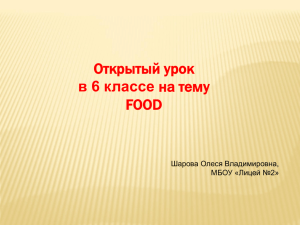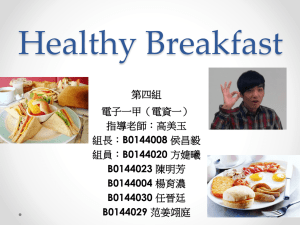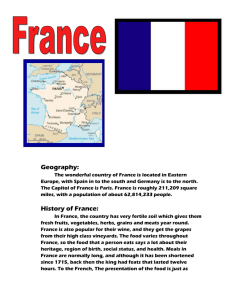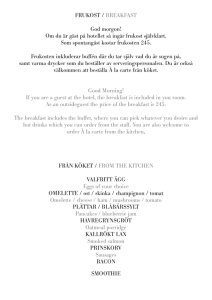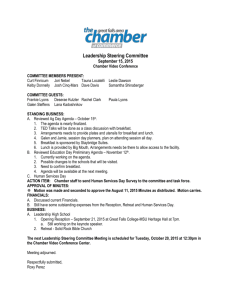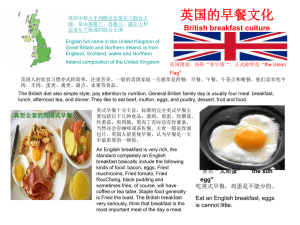File
advertisement
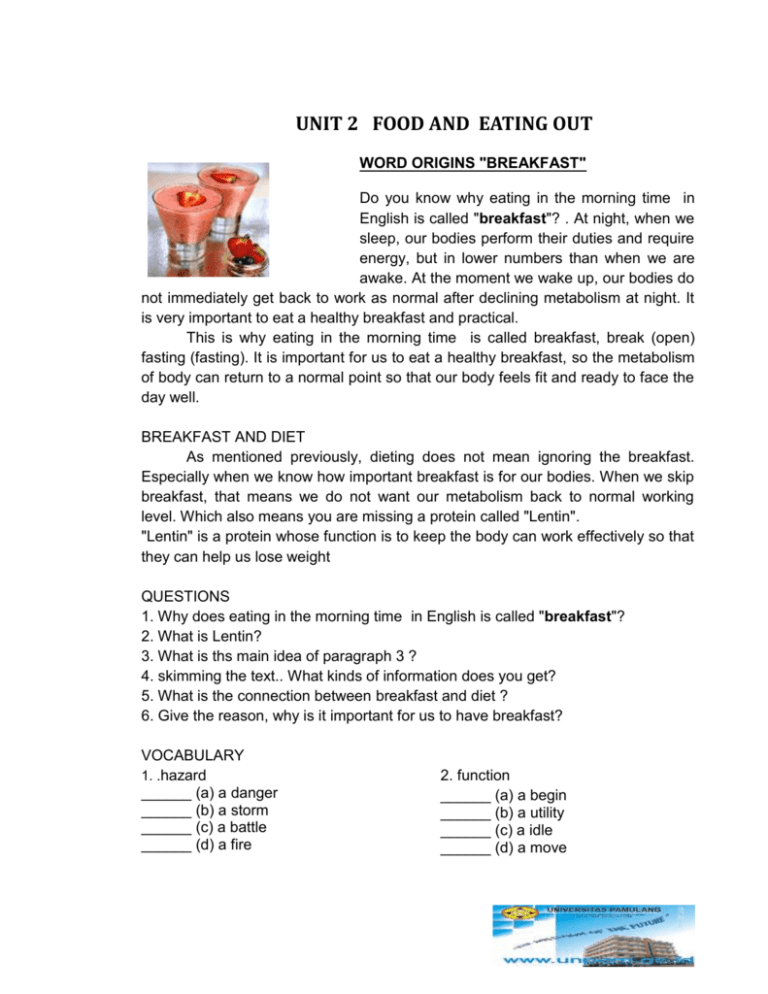
UNIT 2 FOOD AND EATING OUT WORD ORIGINS "BREAKFAST" Do you know why eating in the morning time in English is called "breakfast"? . At night, when we sleep, our bodies perform their duties and require energy, but in lower numbers than when we are awake. At the moment we wake up, our bodies do not immediately get back to work as normal after declining metabolism at night. It is very important to eat a healthy breakfast and practical. This is why eating in the morning time is called breakfast, break (open) fasting (fasting). It is important for us to eat a healthy breakfast, so the metabolism of body can return to a normal point so that our body feels fit and ready to face the day well. BREAKFAST AND DIET As mentioned previously, dieting does not mean ignoring the breakfast. Especially when we know how important breakfast is for our bodies. When we skip breakfast, that means we do not want our metabolism back to normal working level. Which also means you are missing a protein called "Lentin". "Lentin" is a protein whose function is to keep the body can work effectively so that they can help us lose weight QUESTIONS 1. Why does eating in the morning time in English is called "breakfast"? 2. What is Lentin? 3. What is ths main idea of paragraph 3 ? 4. skimming the text.. What kinds of information does you get? 5. What is the connection between breakfast and diet ? 6. Give the reason, why is it important for us to have breakfast? VOCABULARY 1. .hazard ______ (a) a danger ______ (b) a storm ______ (c) a battle ______ (d) a fire 2. function ______ (a) a begin ______ (b) a utility ______ (c) a idle ______ (d) a move 3. important , except ______ (a) a vital ______ (b) a secondary ______ (c) a essential ______ (d) a dominant 4. miss ______ (a) a exist ______ (b) a present ______ (c) a astray ______ (d) attend 5. ignore, except ______ (a) omit ______ (b) acknowledge ______ (c) neglect ______ (d) .disregard 6. healthy ______ (a) a.lusty ______ (b) an ill ______ (c) a sick ______ (d) a fragile 7. require, except ______ (a) a depend on ______ (b) a desire ______ (c) appeal ______ (d) a.dislike 8. return ______ (a) a.convey ______ (b) a depart ______ (c) a keep ______ (d) a pay 9. perform, except ______ (a) a achieve ______ (b) a accomplish ______ (c) a.give up. ______ (d) an act 10. effective ______ (a) a dormant, ______ (b) an efficient ______ (c) An inert ______ (d) a lazy 11. previous, except ______ (a) before ______ (b) a former ______ (c) a precedent ______ (d) a current 12. lose ______ (a) a.rid ______ (b) a confront ______ (c) a succed ______ (d) a meet 13. skip, except ______ (a) a bounce ______ (b) a.seek ______ (c) a avoid ______ (d) a jump over 14. immediately, except ______ (a) soon ______ (b) later ______ (c) at once ______ (d) a paramount 15. decline ______ (a) a.refuse ______ (b) a accept ______ (c) say yes ______ (d) approve FOOD Understanding an English menu depends not only on knowledge of particular dishes, but also on familiarity with cooking techniques. The key to these ways of preparing food is the cooker itself. Contrary to many students expectations, the cooker is not the person who prepares the food - that is the cook - but the machine used to supply heat. Most cookers have four hot-plates, usually situated on the top surface. Other names for hot-plates are gas or electric rings. These are used for boiling, steaming, poaching, frying and for making chips. Below the hot-plates, you normally find the grill which delivers heat from above. Grilled bacon and toasted bread are commonly eaten for breakfast in Britain. Below the grill, is a chamber called the oven which is used for roasting and baking. A roast potato is peeled and cooked in oil, while a baked potato remains in its jacket. Some words on the menu assume more than one process. For example, a mashed potato is created first by boiling and then by mashing - crushing the boiled potato with a fork. Butter is usually added to give the final product a smoother texture. A. QUESTIONS 1. Should the government make it more expensive for farmers to use pesticides and more profitable for them to grow organic food."? 2. Which age-group in your country eats most fast and convenience food? What could be done to encourage these people to eat more fresh food? 3. Should the law limit the number of fast food restaurants in our towns? 4. Should suppliers be permitted to irradiate fruit and vegetables to make them stay greener for longer on the shop shelves? 5. Do you think you can get all the nourishment you need from a vegetarian diet? Would you be happy to eat a vegetarian diet for a week? 6. The Hay diet encourages you to separate protein from carbohydrate, while the Chinese "Ying & Yang" diet encourages balanced eating. 7. Can you describe any special diets which are followed in your country? B. VOCABULARY Find the "odd one out" A B C 1. a cooker a cook a chef 2. boiling cuisine cooking 3. a course a meal a dish 4. convenience food frozen food fast food 5. vitamins carbohydrates proteins 6. baking frying roasting 7. a hot-plate an electric ring a grill 8. a trolley bag BREAKFAST a baske cart MENU EATING OUT CHEESE [cheez] Perhaps the savoriest idiom on this list, the word cheese can refer to a person or thing that is important or splendid as well as to the delicious dairy product. The usage is thought to have origins in Urdu, from the Persian ch«z meaning "thing." In common usage, "the big cheese" is a person of importance or authority, and cheese is often associated with smiling based on the "say cheese" method of posing for pictures. Hamburge [ham-bur-ger] These 4th of July classics actually derive their names from Africa, Asia, and other surprising locales. The word hamburger owes its origins to the German city of Hamburg. Historians believe that around th same time sausage-makers were refining their meat products, cooks in Hamburg served up a cooked version of steak tartare. COLA COLA The word cola actually comes from a tree, not a drink. It is named after the cola-nut tree, which is native to tropical western Africa. Colas were originally made with the dried leaves and nuts of cola tress, so both Pepsi-Cola and Coca-Cola took their names from their main ingredients! UNIT 3 SHOPPING In a department store Shopkeeper: Good afternoon. Is there anything I can help you with? Customer : ____________________ Shopkeeper: Why? What’s with it? Customer : ________________________ Shopkeeper: Sorry, you can’t exchange the shirt you bought. Why don’t you give it to your brother? I’m sure he would be happy with it. Customer : _________________________ Shopkeeper: I am sorry, the receipt says once a product has been purchased, it can’t be returned. Woman : Did you hear the story of the news this morning about apartment fire down street ? Man : I heard something about it. What happened exactly ? Woman : A fire started about three o’clock in the morning in an apartment complex with about twenty apartments. One of the apartments was completely destroyed, and several of the others were damaged. Man : Do they know how the fire started ? Woman : They are not sure at this point, but they believe that it was started by someone smoking in bed. It’s a shame that one careless person can cause so much trauma for others, not to mention the thousands and thousands of dollars of damage. Man : Even more serious than the damage to property is the harm to the apartments’ occupants. I hear that several residents were rushed to the hospital, but at least none of them died. Woman : It’s all so frightening. Do you know of anything I can do to keep this from happening to me ? Man : I guess the best thing to protect yourself is to make sure that you have a smoke alarm and a fire extinguisher in good working condition. The smoke alarm will give you an early warning that a fire has started, so you can call the fire department. If it is a small fire, maybe you can use the fire extinguisher to help put out the fire before the fire trucks arrive. Woman : That’s a good advice. I think I’ll go home and check my smoke alarm.. Today’s supermarket is a large departmentalized retail store. It sells mostly food items, but also health and beauty aids, housewares, magazines, and much more. The dominant features of supermarkets are large in-store inventories on self-service aisles and centralized checkout lines. The inclusion of non-food items on supermarket shelves was once considered novel. This practice is sometimes called “scrambled marketing.” It permits the supermarket, as well as other types of retail stores, to sell items that carry a higher margin than most food items. In general, however, supermarket profits are slim—only about 1 to 3 percent. Owners rely on high levels of inventory turnover to reach their profit goals.Supermarkets were among the first retailers to stress discount strategies. Using these strategies, supermarkets sell a variety of high-turnover goods at low prices. To keep prices down, of course, supermarkets must keep their costs down. Other than the cost of the goods they sell, supermarkets’ primary costs involve personnel. By not offering delivery and by hiring cashiers and stockers rather than true sales personnel, supermarkets are able to keep prices at a relatively low level. 1. Find the sentence in paragraph 1 that gives he most important characteristics of supermarkets. 2. Find the sentence in paragraph 2 that explains the advantage of “scrambled marketing.” 3. Find the sentence in paragraph 3 tha explains how supermarkets are able to sell goods cheaply.. 4. Skimming at least 4 informations from the text 5. Why do people need a market? Fill in the blank which the suitable verb Two days ago, Jenny and Arnold had dinner at an Italian restaurant. Both of them ______ (1) one medium pizza. Jenny had ____ (2) of soup as the appetizer ______ (3). Arnold had a bowl of fruit salad. They ordered ___ (4) drink for Arnold and orange juice for Jenny. They ___ (5) their meal until Jenny ___ (6) a piece of button in her soup. They made a ___ (7) to the restaurant manager. They ____ (8) a replacement. The manager was (9) ……. about it and (10) ……the replacement of the soup. 1. a. asked c. a plate 4. a. hard b. wanted d. a can b. smooth c. ordered 3. a. and c. sour d. bought b. but d. soft 2. a. a cup c. while 5. a. enjoyed b. a bowl d. then b. hated c. liked d. ate 6. a. saw b. found c. looked d. tasted 7. a. compel b. complete c. complain d. compare 8. a. said to b. said for c. asked to d. asked for 9. a. sorry b. happy c. sad d. shy 10. a. sold b. returned c. bought d. gave Write in the letter of the definition on the right that matches the word on the left. ____________ 1. Column. a. Frozen water in the form of flakes ____________ 2. Introduce. b. A part or division of a page ____________ 3. Rowed. c. One of the seasons in Europe ____________ 4. Snow. d. To make know for the first time ____________ 5. Winter . e. Moved through water. .SIGN BOARD UNIT 4 MONEY UNIT 4 MONEY UNIT 4 MONEY Use the words and expressions in the box to complete these paragraphs. advance • bureau de change • cash commission • credit card credit limit • debit card • exchange rate • hard currency interest in the black • in the red • soft currencies • strong transaction • traveller's cheques weak When you go travelling, it is always a good idea to take a bit of 1. (coins and notes) with you: preferably a 2. like US dollars or British pounds*. A lot of places will refuse to change 3. from countries with weak economies. The British pound is 4. at the moment, so when British travellers go to the USA, their pound will buy more dollars. When it is 5. , they will get fewer dollars for their money. You can change 6. at any bank or 7. are offering you first, and also check how much 9. in the city, but check the 8. you will be charged (this can be as high as £5, or 8% of your total 10. they , in some places. If you are using a cash machine abroad to withdraw money, it is better to use a 11. (where money is taken directly from your bank account) rather than get an 12. on a 13. (such as American Express, Visa or Mastercard) as you don't have to pay 14. to the card company. This usually only works, however, if your bank account is 15. and you have sufficient funds. If your account is 16. (there is no money in your account and / or you owe your bank money), you may not be able to withdraw money from it (unless your bank gives you a good 17. ) AN IDIOM is an informal expression often used in spoken English. In many cases, the words do not have their literal meaning (for example, to paint the town red means to go out and have a good time in the evening). Complete each idiom in bold with an appropriate word from A, B or C. Each idiom is explained in italics after each sentence. 1. Despite a huge variety of restaurants selling excellent local dishes, many tourists prefer to eat food. (fast food / convenience food such as hamburgers, pizzas, etc, which are not very healthy for you) A. rubbish B. junk C. garbage 2. Airlines are reluctant to admit that delays, poor in-flight service and cramped, UNIT 4 MONEY uncomfortable seating are the cause of air . (anger and aggression often experienced by air travellers and directed towards air crew or fellow passengers) A. rage B. fury C. anger 3. The motorway is the quickest way of getting from Paris to Marseilles, but many drivers prefer to take the slower route. (a road that goes through an area of natural beauty, such as mountains, countryside, etc) A. pretty B. picturesque C. scenic 4. He's always going on holiday to interesting and exciting places. He's such a globe. (somebody who travels a lot) A. runner B. hopper C. trotter 5. Many tourists staying in the area are kept in tourist where they rarely get a chance to meet the local people and experience local culture. (an enclosed resort surrounded by high fences, etc, designed to keep local people out and tourists in) A. ghettoes B. slums C. dives 6. Although the flight was fully booked, there were several seats available at the last minute because of no- . (people who have booked a seat on an aircraft or in a restaurant, a room in a hotel, etc, and don't arrive) A. appears B. arrives C. shows 7. This hotel is dirty and uncomfortable. It's a real and, usually, cheap hotel) A. doghouse B. fleapit C. chicken coop ! (a dirty, uncomfortable 8. I've got bad belly: I shouldn't have had that prawn salad last night. (stomach ache caused by eating unhygienically-prepared food) A. Birmingham B. Delhi C. Bangkok 9. If you miss the last bus, you should take a taxi back to the hotel: don't try to a lift. (hitch-hike) A. thumb B. finger C. hand 10. The resort was in the middle of , so there was nothing interesting to see or do. (isolated from any towns, villages, etc) A. everywhere B. somewhere C. nowhere 11. Local restaurants are very cheap, so you won't every night. (spend a lot of money) A. rob B. bankrupt C. break the bank by eating out 12. I travel a lot on business, so I seem to spend most of my life living out of a from home a lot) A. bag B. suitcase C. rucksack 13. enjoyed the cruise, but it took me a few days to find my sea to being be on a ship without feeling seasick) A. stomach B. legs C. head . (to be away I really . (to adapt 14. The barman tried to -change me: the drink cost £2, I gave him £5 and he only gave me £2 back. (to cheat someone by not giving him the correct money in change) UNIT 4 A. small B. short MONEY C. little 15. anywhere for years, and then suddenly I got do some travelling. (a desire to travel and see different places) A. itchy B. scratchy C. tickly I hadn't been feet and decided to 16. I always try to travel when I go on holiday. I usually just take a very small suitcase and nothing else. (to take very little luggage with you when you travel) A. light B. gentle C. easy 17. don't like staying in busy resorts. I prefer to go somewhere that's off the I tra ck. (away from popular areas) A. beaten B. well-walked C. tramped 18. When I arrive in a foreign city, I can't wait to A. run B. play C. do the sights. (to go sightseeing) 19. Passengers flying from Britain to Australia often the journey for a day or two in somewhere like Hong Kong or Singapore. (stop somewhere for a short time during a long journey) A. split B. crack C. break 20. One of the biggest problems anyone faces when they travel abroad is culture anxiety that travellers experience when visiting a different country) A. surprise B. shock C. daze . (confusion or 21. Applying for a visa often involves dealing with a lot of A. blue B. white C. red tape. (bureaucracy) 22. £15 for a hamburger and a plate of fries? What a A. rip B. tear C. pull -off! (something that costs too much) 23. Don't eat in that restaurant. It looks nice from the outside, but it's a real tourist . (a place that is in a good location to attract tourists, but is overpriced and generally provides poor service) A. pit B. trap C. trick 24. Last year we went on a visit to Europe: we did seven capital cities in seven days! (a very short visit) A. running B. flying C. hurrying 25. The manager insisted our trip to Madrid was for business, but everyone knew it was really a . (a trip that people pretend is for business, but which is really for relaxation and pleasure) A. junket B. crumpet C. trumpet UNIT 4 MONEY Use The Words And Expressions In The Box To Complete These Paragraphs. backward pricing • duty fee-based pricing penalty predatory pricing commission • inclusive • • • • price cutting service surcharge cost-plus maintenance • • • • price discrimination VAT (Value Added Tax) When you buy an airline ticket, there are several questions you should ask yourself. First of all, is the price you are being charged 1. ? For example, does it include 2. (in Britain, this will add another 17.5% to the cost of your ticket), an airport 3. charge, airport 4. tax or (in the UK) Air Passenger 5. ? Also, if you change the date or time of your flight, will you have to pay a financial 6. ? You should also be aware that you might be required to pay a 7. before you fly (for example, to pay for unexpected rises in fuel costs) Many tour operators, airlines, etc, have a policy of 8. (they check their competitors’ prices before setting their own), and this can result in serious 9. , which is great news for travellers. Sometimes they charge different prices for different groups of people: this policy of 10. can result in very cheap prices for travellers who are more flexible with dates, times and so on. Some operators have recently been accused of 11. in order to prevent their competitors from succeeding in the market (or in some cases, to prevent new competitors entering the market). When travel agencies sell holidays or tickets for travel, they either receive a 12. 14. from the tour operator, or have a 13. system (usually on a basis), where they add a percentage to the tour operators' prices (agreed in advance with the tour operator) and charge this to the customer. UNIT 4 MONEY What are the nationalities of the people who come from the countries and territories listed below? (For example, Dr Kali comes from Afghanistan, so he is Afghan). Set yourself a time limit of 10 minutes and write down as many as you can. 1. Afghanistan 29. Morocco 2. Argentina 30. Myanmar 3. Australia 31. Nepal 4. Belgium 32. The Netherlands 5. Brazil 33. New Zealand 6. Canada 34. Norway 7. Chile 35. Oman 8. China 36. Peru 9. Cuba 37. The Philippines 10. Cyprus 38. Russia 11. Czech Republic 39. Saudi Arabia 12. Denmark 40. Singapore 13. Egypt 41. Slovakia 14. Finland 42. South Korea 15. France 43. Spain 16. Greece 44. Sudan 17. Hong Kong 45. Sweden 18. India 46. Switzerland 19. Iran 47. Syria 20. Iraq 48. Thailand 21. Japan 49. Turkey 22. Jordan 50. Ukraine 23. Kazakhstan 51. United Kingdom 24. Kenya 52. United States of America 25. Kuwait 53. Venezuela 26. Laos 54. Vietnam 27. Libya 55.Yemen 28. Malta 56. Zimbabwe UNIT 4 MONEY UNIT 4 MONEY
